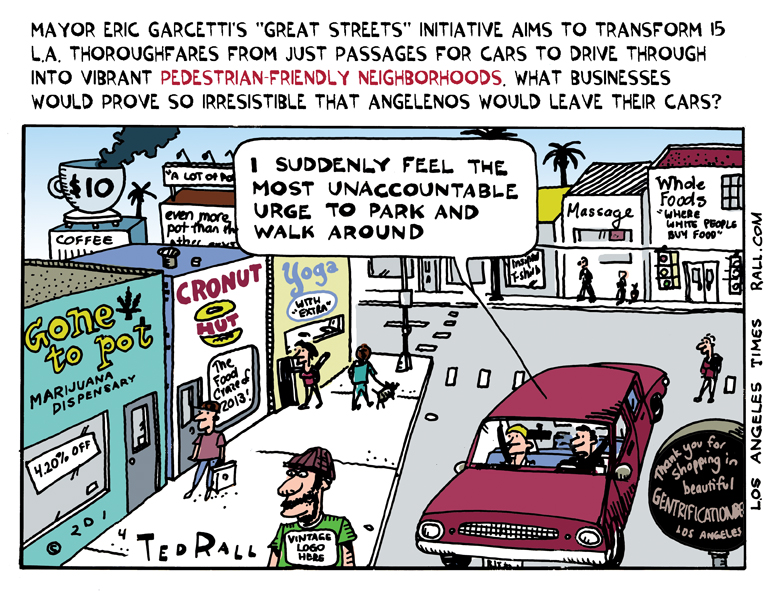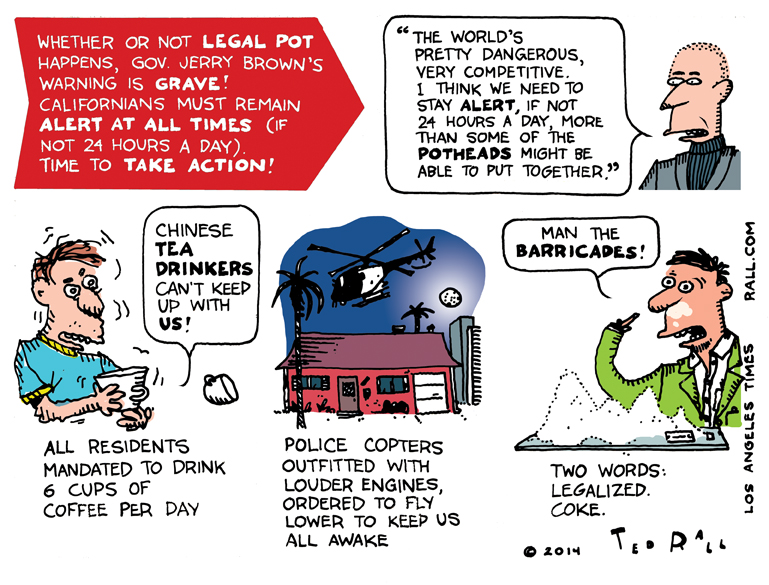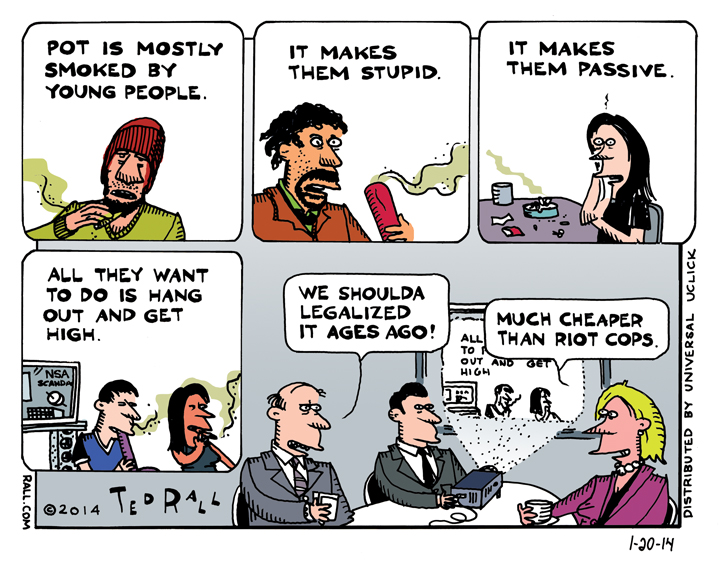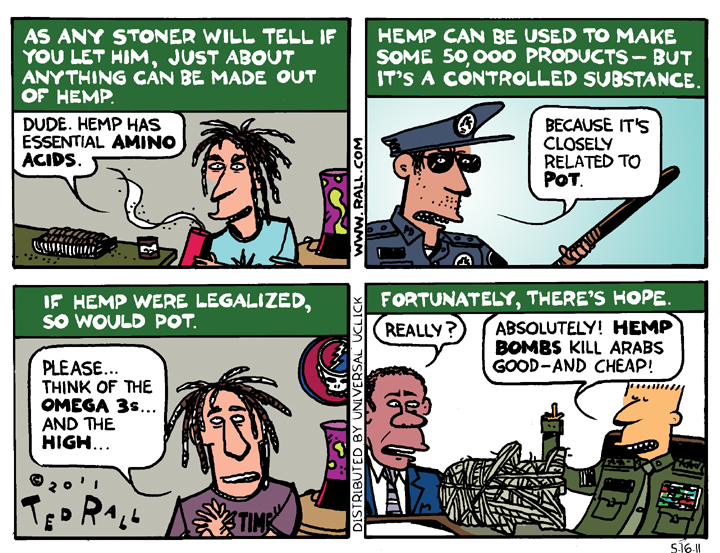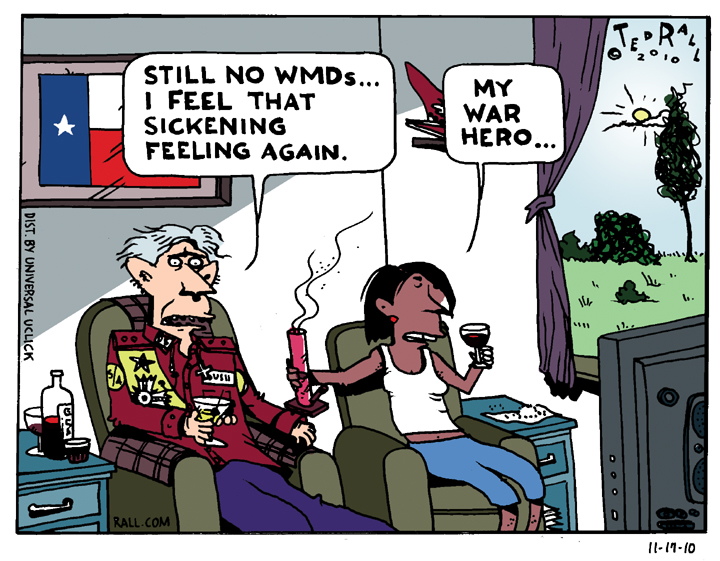Whether it’s a soaring literary classic like Les Misérables or generic Hollywood product like The Butterfly Effect, I’m drawn to stories in which a minor event triggers a series of unforeseen dramatic events. As Springsteen wrote and Dave Edmunds sang, from small things big things one day come.
A real-life example transpired three weeks after the 9/11 attacks, when I was falsely accused of jaywalking — a misdemeanor at the time — by an LAPD officer who roughed me up and handcuffed me to boot. For 14 years, nothing happened as the result of that arrest on October 3, 2001. In the summer of 2015, without warning, getting busted for jaywalking blew up my life.
Tiny problems can wreak havoc. Like the O-ring. Hell, I got expelled from college over a wart.
The jaywalking thing cost me my job as the staff cartoonist at the Los Angeles Times, damaged my reputation to the point where I was nearly blacklisted from journalism and cost me friends and colleagues. It made me doubt the ability or willingness of journalism, the love of my life, to do the right thing. It convinced me beyond a reasonable doubt that the justice system is hopelessly corrupt. I drank too much. Who knows—the weight I gained may eventually kill me.
I am grateful for every day that passes when I don’t think about jaywalking or the LA Frigging Times. Unfortunately there was no way to distract myself this week. California governor Gavin Newsom signed a new law decriminalizing jaywalking. As of the first of the coming year the Freedom to Walk Act means you’ll be allowed to cross a street in the Golden State—safely! look both ways before crossing, like mom taught you—without fear of being fined, handcuffed, beaten, arrested or even killed by a lunatic cop unless “a reasonably careful person would realize there is an immediate danger of collision with a moving vehicle or other device moving exclusively by human power.” (The legislation is silent on devices powered by other animals or plants.)
Jaywalking tickets are big business in California. In Los Angeles alone, the LAPD raised $6.2 million in revenues by fining 31,712 accused jaywalkers between 2010 and 2020. Blacks were targeted more than three times their presence in the population.
Several well-meaning readers contacted me to inform me of California’s new law, which I support wholeheartedly except for an all-too-common omission: it’s not retroactive. Those who have suffered fines, imprisonment and other punishments under a law that is subsequently repealed ought to be made whole. If slaves were emancipated by the conclusion of the Civil War in 1865, escaped slaves and those who helped them who were punished for their “crimes” should receive apologies and restitution by 1866. Merely erasing a conviction from your criminal record, as some states that have legalized marijuana have done, isn’t enough.
Anyone who is charged and convicted for a crime that is no longer a crime ought to be refunded their fines and attorneys’ fees, plus compound interest charged at the highest credit card rate. Anyone who spent time in jail or prison for an offense that is no longer viewed as an offense under the law should be generously compensated by the state or city responsible for their conviction.
Even if California were to come to its senses and pay millions of dollars in penance to everyone who suffered under bigoted jaywalking laws that were originally conceived by automobile companies as a way to discourage walking and sell more cars, there still wouldn’t be any way to undo all the weird side effects of what we now recognize as an obsolete form of oppression.
For poor Californians, the $196 jaywalking fine was devastating. Under our vicious capitalist system, there can be no doubt that some people failed to make rent and even lost their homes after being targeted by police enforcing this idiotic statute.
As a solvent, able-bodied, white, cis male, Ivy League graduate, paying the citation was no big deal. But even for me, it was a train wreck.
Upset about being falsely accused — I wasn’t jaywalking, the cop made it up — and mistreated, I filed an internal affairs complaint against the officer back in 2001. Citizens are ignored in such cases 96% of the time, and I was no exception. By 2015 I had been working for the LA Times for six years. But I didn’t know two things. First, a thin-skinned police chief was furious every time I drew a cartoon criticizing the police. Second, in 2014, the LAPD union bought an interest in the parent company of the LA Times and formed an obscene corrupt alliance with the paper’s publisher, multibillionaire Austin Beutner.
In 2015 Beutner and Chief Charlie Beck held a secret meeting where, clearly needing more important things to do to fill their time—they should try golf, the evil rich love it—they conspired to ruin me. Beck dredged up my old IA complaint file, which contained an audio recording the cop had made of my jaywalking arrest: basically six minutes of wind and street noise. At Beutner’s direction the Times wrote a piece that argued the cop was kind and polite, and that my description of the encounter in a Times blog piece was false, so I must be fired for crimes against journalism.
Fox News, Breitbart and the rest of the right-wing mediasphere had a field day dragging the corpse of my reputation across the Internet.
Ultimately, I was vindicated. The doctoring of the tape, the Beck-Beutner conspiracy, the fact that I’d told the truth about what happened in 2001 while the LAPD Times had lied all came out in the media and through the course of a lengthy court battle. There’s no telling how much work I’m not getting as a result of the Times’ defamation campaign, though I am working.
The experience changed me, mostly for the worse.
Nothing could make me, or the other people hurt by California’s repealed jaywalking law, whole again. But the state should try.
Every state should try, every time it repeals a bad law.
(Ted Rall (Twitter: @tedrall), the political cartoonist, columnist and graphic novelist, co-hosts the left-vs-right DMZ America podcast with fellow cartoonist Scott Stantis. You can support Ted’s hard-hitting political cartoons and columns and see his work first by sponsoring his work on Patreon.)

